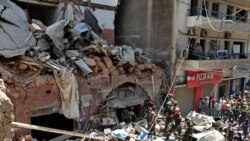Funerals are being held as Lebanon continues to reel from a devastating explosion that rocked the capitol of Beirut earlier this week. The blast killed at least 130 people, wounded thousands and left tens of thousands homeless in a country already in a fragile state after months of a spiraling economic crisis and the COVID-19 pandemic. For many Lebanese, Tuesday's blast was the last straw after years of corruption and mismanagement by a political elite that has ruled for decades. The explosion has elevated anger at authorities for allowing huge quantities of a highly explosive material used to make fertilizers and bombs, to be stored in a warehouse at the port in unsafe conditions for years. As nations send aid, French President Emmanuel Macron flew to Beirut on Thursday where he toured shattered streets and consoled distraught residents amid rubble covered roads and shops with blown out windows. The International Committee of the Red Cross in Lebanon is working alongside the Lebanese Red Cross to provide medical supplies and other assistance to citizens coping with the aftershock of what will likely be a very long and difficult recovery.













